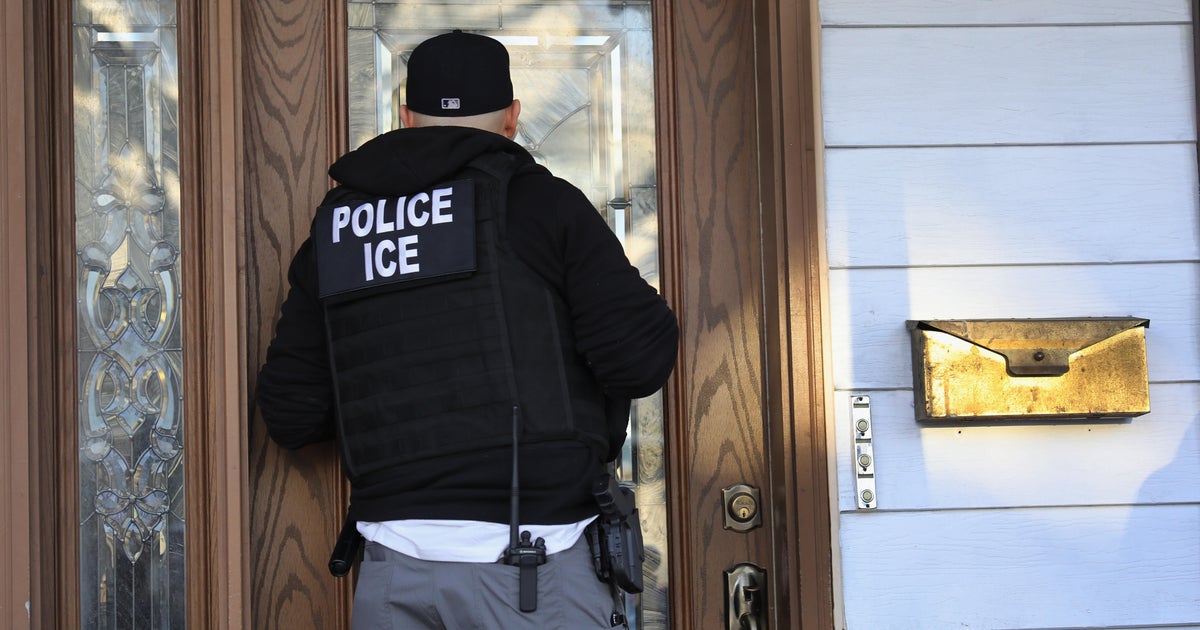Mexico's ex-security chief sentenced to nearly 40 years in U.S. prison for taking bribes from cartel run by "El Chapo"
The man once heralded as the architect of Mexico's war on drug cartels was sentenced to more than 38 years in a U.S. prison on Wednesday for taking massive bribes to aid drug traffickers.
Genaro García Luna, Mexico's former secretary of public security, was convicted by a New York jury in 2023 of taking millions of dollars in bribes to protect the violent Sinaloa cartel that he was supposedly combating.
Garcia Luna led Mexico's federal police before he served in a cabinet-level position as the country's top security official from 2006 to 2012 under then-President Felipe Calderón. At the time, García Luna was hailed as an ally by the U.S. in its fight on drug trafficking.
But prosecutors say that in return for millions of dollars, he provided intelligence about investigations against the cartel, information about rival cartels and the safe passage of massive quantities of drugs.
According to the U.S. Justice Department, former cartel members testified that bribe money was handed off to Garcia Luna in a variety of locations, including at a "safe house" where cash was hidden in a false wall, at a car wash and at a French restaurant across the street from the U.S. Embassy.
Garcia Lina was paid in U.S. cash, "stuffed variously in suitcases, briefcases and duffel bags," prosecutors said.
Federal prosecutors in Brooklyn had asked a judge to order that Genaro García Luna be incarcerated for life, while his lawyers argued that he should spend no more than 20 years behind bars.
García Luna, 56, was convicted early last year of taking millions of dollars in bribes to protect the violent Sinaloa cartel that he was supposedly combating. He denied the allegations.
Prosecutors wrote that García Luna's actions advanced a drug trafficking conspiracy that resulted in the deaths of thousands of American and Mexican citizens.
"It is difficult to overstate the magnitude of the defendant's crimes, the deaths and addiction he facilitated and his betrayal of the people of Mexico and the United States," prosecutors wrote. "His crimes demand justice."
García Luna headed Mexico's federal police before he served in a cabinet-level position as the country's top security official from 2006 to 2012 during the administration of former Mexican President Felipe Calderón.
García Luna was not only considered the architect of Calderón's bloody war on cartels, but was also hailed as an ally by the U.S. in its fight on drug trafficking. During the trial, photos were shown of García Luna shaking hands with former President Barack Obama and speaking with former Secretary of State Hillary Clinton and former Sen. John McCain.
But prosecutors say that in return for millions of dollars, García Luna provided intelligence about investigations against the cartel, information about rival cartels and the safe passage of massive quantities of drugs.
Prosecutors said he ensured drug traffickers were notified in advance of raids and sabotaged legitimate police operations aimed at apprehending cartel leaders.
Drug traffickers were able to ship over 1 million kilograms of cocaine through Mexico and into the United States using planes, trains, trucks and submarines while García Luna held his posts, prosecutors said.
During former Sinaloa kingpin Joaquin "El Chapo" Guzman's trial in the same court in 2018, a former cartel member testified that he personally delivered at least $6 million in payoffs to García Luna, and that cartel members agreed to pool up to $50 million to pay for his protection. "El Chapo" is serving a life sentence in a maximum security prison in Colorado after being convicted in 2019 on charges including drug trafficking, money laundering and weapons-related offenses.
Prosecutors also said that García Luna plotted to undo last year's trial verdict by seeking to bribe or corruptly convince multiple inmates at the Metropolitan Detention Center in Brooklyn to support false allegations that two government witnesses communicated via contraband cellular phones in advance of the trial.
In their appeal for leniency, García Luna's lawyers wrote to a judge that García Luna and his family have suffered public attacks throughout the nearly five years he has been imprisoned.
"He has lost everything he worked for - his reputation, all of his assets, the institutions that he championed, even the independence of the Mexican judiciary - and he has been powerless to control any of it," they wrote.
"Just in the past five years he has lost two siblings, learned of the disability of another due to COVID-19 complications and the imposition of an arrest warrant against her, and learned that his youngest sister was jailed because of her relationship to him," they added.
In Mexico, President Claudia Sheinbaum briefly commented on the case on Tuesday, saying: "The big issue here is how someone who was awarded by United States agencies, who ex-President Calderón said wonderful things about his security secretary, today is prisoner in the United States because it's shown that he was tied to drug trafficking."
U.S. attorney Breon Peace said in a statement that the sentencing was "a critical step in upholding justice and the rule of law."
"His betrayal of the public trust and the people he was sworn to protect resulted in more than one million kilograms of lethal narcotics imported into our communities and unleashed untold violence here and in Mexico," Peace said.
Garcia Luna's sentence comes less than three months after the dramatic arrest on U.S. soil of Sinaloa Cartel co-founder Ismael "El Mayo" Zambada, who claimed he had been kidnapped in Mexico and delivered into U.S. custody against his will. Zambada pleaded not guilty last month in New York in a drug trafficking case that accuses him of engaging in murder plots and ordering torture.
Zambada, 76, was detained along with Joaquin Guzman Lopez, a son of El Chapo.




